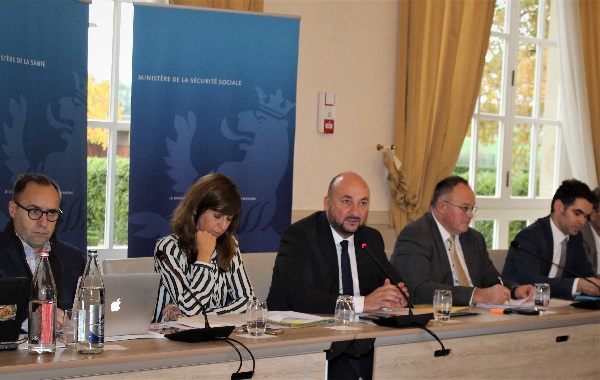 Quadripartite committee;
Credit: MSAN
Quadripartite committee;
Credit: MSAN
The Quadripartite Committee met on Wednesday 13 November 2019 in Mondorf-les-Bains to discuss matters related to health and maternity insurance.
Under the presidency of Luxembourg's Minister of Social Security, Romain Schneider, in close collaboration with Deputy Prime Minister and Minister of Health, Étienne Schneider, the Quadripartite Committee first examined the current financial situation of health and maternity insurance in the Grand Duchy, as well as the latest financial forecasts.
According to the latest data, the current financial situation of health and maternity insurance is in line with an operating profit estimated at €52.6 million for 2019, after a surplus of €1132.5 million in 2018. Thus, the cumulative overall balance of health and maternity insurance should increase from €869.7 million in 2018 (30.2% of current expenditure) to €922.3 million in 2019 (29.3% of current expenditure).
For the financial year 2020, the latest estimates show a financial balance for current operations of around €40 million. The cumulative overall balance would thus increase to €962.5 million or 28.8% of estimated current expenditure for 2020.
Romain Schneider praised the good financial management of health and maternity insurance which materialised in a financial equilibrium, despite the impacts that have led to an increase in expenditures such as the budgeting of certain activities of the National Laboratory of Health and the Rehabilitation Centre of Colpach, as well as improvements in benefits and other measures for insured persons.
Concerning revenues, the Social Security Minister emphasised the good evolution of employment and thus the number of insured persons and he recalled that the Luxembourg Government had decided to maintain the contribution of €20 million until 2021 for the maternity component of this pillar of social security.
Romain Schneider also announced that "following a constructive dialogue, a dialogue between all the stakeholders has made it possible to stop the setting up of the working groups of the future 'Gesondheetsdësch' in order to deepen the subject and suggest ways forward". The five thematic working groups will have to prepare reports on the selected topics for a political discussion that will take place at the end of their work.
The themes are: "Towards a better complementarity between hospital and non-hospital sectors"; "Improving relations with protected persons and providers"; "Prevention in the field of health"; "The use of new technologies in health"; "Financing the health system".
Ministers also underscored their clear political will for close cooperation with all relevant health and care partners to ensure a health system ready for the future. At the level of the nomenclature of acts and services, joint efforts made in recent years will be continued to modernise and adapt the catalogue of services. Romain Schneider explained: "Our social security system must meet the needs of insureds with a state-of-the-art offer that respects the principles of maternity-health insurance, such as mandatory bonding, which is a cornerstone of the system. In the interest of the insured and also of the service providers, particularly doctors and dentists, we must jointly continue this work".
On 23 October 2019, the Nomenclature Committee resumed its work in the presence of the representatives of the Association of Doctors and Dentists. The resumption of work follows the implementation of the agreement of 26 June 2019, which had been issued by the Minister of Social Security after a meeting between the Minister of Social Security and all the organisations represented within the Nomenclature Committee. The rapid progress of the work of the Nomenclature Committee will take place in a structured way on the basis of the already adopted common approach, which will be updated.
Regarding the management of benefits, Romain Schneider continued: "Improving insureds' access to health care benefits is one of my priorities. The implementation [is through] a simplification of the procedures, dematerialisation and the recourse to modern computer tools. At the heart of these efforts are the insured who currently have to pay sometimes large amounts before they can be reimbursed. This is why the direct financial support of the services (third-party payment) will be introduced while meeting the needs of the insured, the providers and the CNS".
In this context, Minister Schneider presented the state of play of the development of a new generation third-party payer whose concept with the stages of implementation will be presented to all stakeholders.








